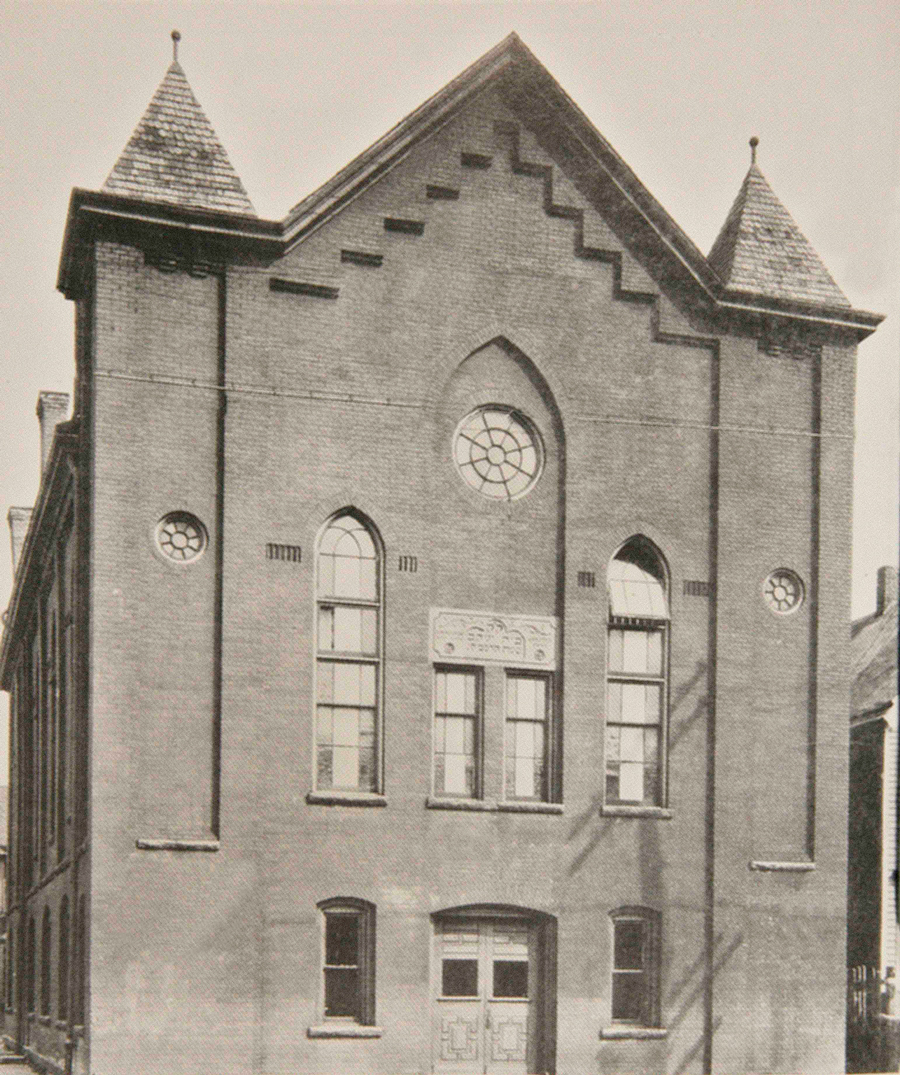Synagogues / Beth Jacob
Beth Jacob, also known as the Clinton Street Shul was founded in the nineteenth century as a breakaway from Congregation Brith Sholem.
Overview
Beth Jacob synagogue was founded in 1881 based on orthodox lines drawing members of Prussian, Lithuanian and Polish Jewish origins, many of whom came from Suwalki. It closed in the 1940s. Despite the fact that this congregation was formed in 1881, and might have been created as a response to newly arriving immigrants fleeing the pogroms in Russia, it was a local response of families already settled in Buffalo who split away from Congregation Brith Sholem. The first meeting of the congregation was held on October 2, 1881, and it was formerly incorporated on November 20, 1881. The cemetery was founded a year later in 1882 and located on Doat Street in Buffalo, where it is now supported by the Jewish Federation Cemetery Corporation. The new congregation, like so many others in its early days, first met in private homes, but by 1894 it built on Walnut and Clinton Streets, and thereafter was locally known as the Clinton Street Shul. The shul was demolished in 1959 to make way for urban redevelopment. Some of its founder members included Jacob H. Mayerberg, Louis Rubenstein, Joseph Saperston, David Friedlander, Simon Harris and Simon Cohen, some of whose family branches were inter-related and their descendants still live in Buffalo. Harry Singer, known as “Hazzan Singer” was the first Hazzan (Hebrew: prayer leader) at Beth Jacob, although he eventually moved over to the rival Congregation Brith Sholem. Rabbis associated with the synagogue included Rabbi Raphael Josephson (who moved to Baltimore), Rabbi M.G. Levensohn and Rabbi Israel M. Fineberg who was a Talmudist trained at the Volozhin Yeshiva (rabbinical seminary). Active members in its last decades included: Joseph Sapowitch and Morris Diamond, both of who were closely identified with the provision of Jewish education.
Discover More
- All that remains of this once thriving synagogue is a cemetery of just under 300 gravestones.
- Much of the cemetery has been transcribed by Jane Clement and Sally Bruckheimer.
- This cemetery is maintained and administered by the Jewish Federation Cemetery Corporation.
- Rabbi Israel Feinberg on FindaGrave.com.
- Rabbi Israel Feinberg Bio.
- For an extensive genealogical study of the Mayerberg, Rubenstein families and more, consult the papers of Dr. Hubert J. Rubenstein, 1853-2006, held at the University at Buffalo, University Archives.
- More about the Jews of Suwalki.
- In 2008, the cemetery was renovated as an Eagle Scout project (chartered by the Jewish Community Center), and led by Joshua Finkelstein and a large volunteer team. To see the work they carried out, you can visit the University Archives at the University at Buffalo where a collection is open for review. Ask for the “Cleanup and Restoration of the Beth Jacob Cemetery Records, 1990-2009 (MS200.19).” To find out more, view the online guide. This community effort was extensively covered in the local news.
Contribute to this Page
Although a guide to Cleanup and Restoration of the Beth Jacob Cemetery work carried out in 2008 is available through the University at Buffalo, University Archives, there are currently no known archives of this congregation. We are seeking information about the architect of the synagogue building as well as organizational photographs, documents, mementos or written recollections relating to Beth Jacob for digitization.
If you have materials relating to Beth Jacob and you’d like to make them available for this purpose, please contact us.

